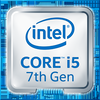Intel Core i5-7600K vs Intel Core i5-6287U
Intel Core i5-7600K
► remove from comparison
Der Intel Core i5-7600K ist ein High-End Quad-Core Desktop-Prozessor auf Basis der Kaby-Lake-Architektur, der im August 2015 vorgestellt wurde. Die in einem verbesserten 14-Nanometer-Prozess gefertigte CPU taktet mit 3,8 bis 4,2 GHz, bietet jedoch kein Hyper-Threading (daher nur 4 Threads). Als sogenanntes "K"-Modell verfügt der Core i7-7700K über einen freien Multiplikator und lässt sich so besonders einfach übertakten.
Performance
Durch die relativ hohe Taktrate positioniert sich der i5-7600K etwa 10% vor dem direkten Vorgänger, dem Core i5-6600K und etwas hinter dem älteren Spitzenmodell i7-4790K. Die Leistung pro Takt ist identisch zu den Skylake Modellen. Auch anspruchsvollste Programme und Spiele werden von der High-End-CPU problemlos bewältigt.
Mehr Benchmarks finden Sie auch in unserem Vergleich der AMD Ryzen 7 CPUs gegen Intel CPUs.
Grafikeinheit
Für Grafikberechnungen zeigt sich die im Prozessor integrierte Intel HD Graphics 630 mit 24 EUs (Execution Units) verantwortlich, die mit 350 - 1150 MHz taktet. Die Leistung ist vergleichbar mit der alten Intel HD Graphics 530 und siedelt sich daher im absoluten Low-End-Bereich an, sodass aktuelle Spiele allenfalls in niedrigen Einstellungen flüssig dargestellt werden.
Leistungsaufnahme
Der TDP ist wie beim Spitzenmodell i7-7700K mit 91 Watt festgelegt.
Intel Core i5-6287U
► remove from comparison
Der Intel Core i5-6287U ist ein Dual-Core-Prozessor für Note- und Ultrabooks auf Basis der Skylake-Architektur, der im September 2015 vorgestellt wurde. Neben den zwei CPU-Kernen samt Hyper-Threading, die mit 3,1 bis 3,5 GHz takten (2 Kerne: max. 3,3 GHz), integriert der Prozessor auch eine Iris Graphics 550 Grafikeinheit inkl. 64 MB eDRAM-Cache sowie einen Dual-Channel-Speichercontroller (DDR3L-1600/DDR4-2133). Die Fertigung erfolgt in einem 14-Nanometer-Prozess mit FinFET-Transistoren.
Architektur
Mit Skylake löst Intel sowohl Broadwell als auch Haswell ab und setzt damit in sämtlichen TDP-Klassen von 4,5 bis 45 Watt wieder auf ein einheitliches Kerndesign. Zu den diversen Verbesserungen der Skylake-Architektur gehören unter anderem vergrößerte Out-of-Order-Buffer, Optimierungen bei Prefetching und Sprungvorhersage sowie stärkere Zugewinne durch Hyper-Threading. Insgesamt fallen die Änderungen für einen "Tock", das heißt eine neue Mikroarchitektur, jedoch eher klein aus, sodass die Pro-MHz-Leistung nur um etwa 5 bis 10 Prozent (gegenüber Haswell) respektive unter 5 Prozent (gegenüber Broadwell) ansteigt.
Auch der Aufbau des eDRAM-Caches wurde von Intel überarbeitet. Statt wie bislang als Victim Cache zu fungieren, der umständlich über den L3-/LLC-Cache angesprochen werden muss, kann der eDRAM nun direkt von Programmen adressiert und als schnellere Vorstufe zum Hauptspeicher genutzt werden. Die Größe beträgt weiterhin 128 MB für die Quad-Core-Modelle (4C + GT4e), Dual-Core-Chips (2C + GT3e) müssen sich mit 64 MB begnügen.
Performance
Entsprechend der spezifizierten Taktraten sowie der leicht gestiegenen Pro-MHz-Leistung ordnet sich der Core i5-6287U etwa auf dem Niveau des Core i5-5350H (Broadwell) ein und gehört damit zu den schnellsten Dual-Core-Prozessoren auf dem Markt. Damit stehen auch für anspruchsvolle Anwendungen und Multitasking ausreichende Reserven bereit.
Grafikeinheit
Die integrierte Grafikeinheit namens Iris Graphics 550 repräsentiert die "GT3e"-Ausbaustufe der Skylake-GPU (Intel Gen. 9). Die 48 Ausführungseinheiten, auch Execution Units oder EUs genannt, takten mit 300 bis 1.100 MHz und dürften in Verbindung mit dem schnellen eDRAM-Cache eine Performance im Bereich einer dedizierten GeForce 930M erlauben. Aktuelle Spiele des Jahres 2015 werden damit in niedrigen bis mittleren Einstellungen flüssig dargestellt. Weitere Informationen zu Performance und Features liefert unsere Detailseite zur Iris Graphics 550.
Leistungsaufnahme
Entsprechend der TDP von 28 Watt ist der Prozessor vorrangig in größeren Ultrabooks und Notebooks zu finden. Optional kann die TDP auch auf 23 Watt abgesenkt werden (cTDP down), was die Performance in einigen Situationen jedoch leicht schmälert.
| Model | Intel Core i5-7600K | Intel Core i5-6287U | ||||||||||||||||||||||||||||||||||||||||||||||||||||||||||||||||||||||||||||||||||||||||||||||||||||||||||||||||||||||||||||||||||||||||||||||||||||||||||||||||||||||||||||||||||||||||||||||||||||||||||||||||
| Codename | Kaby Lake | Skylake | ||||||||||||||||||||||||||||||||||||||||||||||||||||||||||||||||||||||||||||||||||||||||||||||||||||||||||||||||||||||||||||||||||||||||||||||||||||||||||||||||||||||||||||||||||||||||||||||||||||||||||||||||
| Series | Intel Kaby Lake | Intel Core i5 | ||||||||||||||||||||||||||||||||||||||||||||||||||||||||||||||||||||||||||||||||||||||||||||||||||||||||||||||||||||||||||||||||||||||||||||||||||||||||||||||||||||||||||||||||||||||||||||||||||||||||||||||||
| Serie: Core i5 Skylake |
|
| ||||||||||||||||||||||||||||||||||||||||||||||||||||||||||||||||||||||||||||||||||||||||||||||||||||||||||||||||||||||||||||||||||||||||||||||||||||||||||||||||||||||||||||||||||||||||||||||||||||||||||||||||
| Clock | 3800 - 4200 MHz | 3100 - 3500 MHz | ||||||||||||||||||||||||||||||||||||||||||||||||||||||||||||||||||||||||||||||||||||||||||||||||||||||||||||||||||||||||||||||||||||||||||||||||||||||||||||||||||||||||||||||||||||||||||||||||||||||||||||||||
| L1 Cache | 256 KB | 128 KB | ||||||||||||||||||||||||||||||||||||||||||||||||||||||||||||||||||||||||||||||||||||||||||||||||||||||||||||||||||||||||||||||||||||||||||||||||||||||||||||||||||||||||||||||||||||||||||||||||||||||||||||||||
| L2 Cache | 1 MB | 512 KB | ||||||||||||||||||||||||||||||||||||||||||||||||||||||||||||||||||||||||||||||||||||||||||||||||||||||||||||||||||||||||||||||||||||||||||||||||||||||||||||||||||||||||||||||||||||||||||||||||||||||||||||||||
| L3 Cache | 8 MB | 4 MB | ||||||||||||||||||||||||||||||||||||||||||||||||||||||||||||||||||||||||||||||||||||||||||||||||||||||||||||||||||||||||||||||||||||||||||||||||||||||||||||||||||||||||||||||||||||||||||||||||||||||||||||||||
| Cores / Threads | 4 / 4 | 2 / 4 | ||||||||||||||||||||||||||||||||||||||||||||||||||||||||||||||||||||||||||||||||||||||||||||||||||||||||||||||||||||||||||||||||||||||||||||||||||||||||||||||||||||||||||||||||||||||||||||||||||||||||||||||||
| TDP | 91 Watt | 28 Watt | ||||||||||||||||||||||||||||||||||||||||||||||||||||||||||||||||||||||||||||||||||||||||||||||||||||||||||||||||||||||||||||||||||||||||||||||||||||||||||||||||||||||||||||||||||||||||||||||||||||||||||||||||
| Technology | 14 nm | 14 nm | ||||||||||||||||||||||||||||||||||||||||||||||||||||||||||||||||||||||||||||||||||||||||||||||||||||||||||||||||||||||||||||||||||||||||||||||||||||||||||||||||||||||||||||||||||||||||||||||||||||||||||||||||
| Socket | FCLGA1151 | BGA | ||||||||||||||||||||||||||||||||||||||||||||||||||||||||||||||||||||||||||||||||||||||||||||||||||||||||||||||||||||||||||||||||||||||||||||||||||||||||||||||||||||||||||||||||||||||||||||||||||||||||||||||||
| Features | DDR3(L)-1600/DDR4-2400 Memory Controller, AVX, AVX2, AES-NI, TSX-NI, Quick Sync, Virtualization, vPro | Dual-Channel DDR3L-1600/DDR4-2133 Memory Controller, HyperThreading, AVX, AVX2, Quick Sync, Virtualization, AES-NI | ||||||||||||||||||||||||||||||||||||||||||||||||||||||||||||||||||||||||||||||||||||||||||||||||||||||||||||||||||||||||||||||||||||||||||||||||||||||||||||||||||||||||||||||||||||||||||||||||||||||||||||||||
| iGPU | Intel HD Graphics 630 (350 - 1150 MHz) | Intel Iris Graphics 550 (300 - 1100 MHz) | ||||||||||||||||||||||||||||||||||||||||||||||||||||||||||||||||||||||||||||||||||||||||||||||||||||||||||||||||||||||||||||||||||||||||||||||||||||||||||||||||||||||||||||||||||||||||||||||||||||||||||||||||
| Architecture | x86 | x86 | ||||||||||||||||||||||||||||||||||||||||||||||||||||||||||||||||||||||||||||||||||||||||||||||||||||||||||||||||||||||||||||||||||||||||||||||||||||||||||||||||||||||||||||||||||||||||||||||||||||||||||||||||
| $242 U.S. | ||||||||||||||||||||||||||||||||||||||||||||||||||||||||||||||||||||||||||||||||||||||||||||||||||||||||||||||||||||||||||||||||||||||||||||||||||||||||||||||||||||||||||||||||||||||||||||||||||||||||||||||||||
| Announced | = 2934 days old | = 3424 days old | ||||||||||||||||||||||||||||||||||||||||||||||||||||||||||||||||||||||||||||||||||||||||||||||||||||||||||||||||||||||||||||||||||||||||||||||||||||||||||||||||||||||||||||||||||||||||||||||||||||||||||||||||
| Manufacturer | ark.intel.com | |||||||||||||||||||||||||||||||||||||||||||||||||||||||||||||||||||||||||||||||||||||||||||||||||||||||||||||||||||||||||||||||||||||||||||||||||||||||||||||||||||||||||||||||||||||||||||||||||||||||||||||||||
| max. Temp. | 100 °C |
Benchmarks
Average Benchmarks Intel Core i5-7600K → 100% n=8
Average Benchmarks Intel Core i5-6287U → 61% n=8
* Smaller numbers mean a higher performance
1 This benchmark is not used for the average calculation













